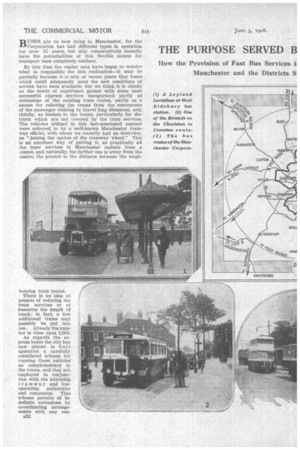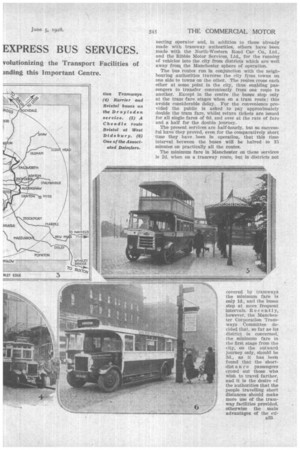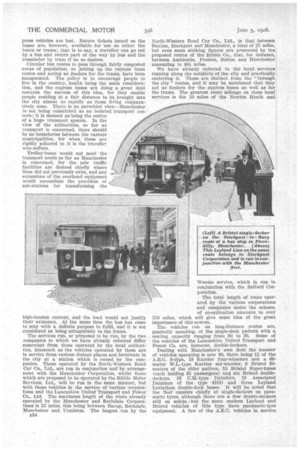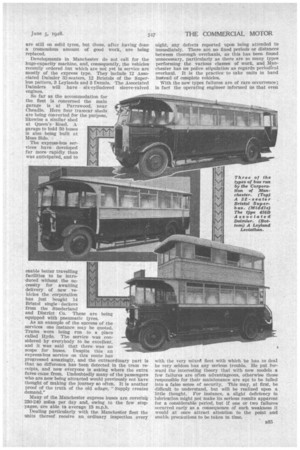THE PURPOSE SERVED B EXPRESS BUS SERVICES.
Page 58

Page 59

Page 60

Page 61

If you've noticed an error in this article please click here to report it so we can fix it.
n USES are no new thing to Manchester, for the -LP Corporation has had different types in operation for over 15 years, but only. comparatively recently have the potentialities of this flexible means for transport been completely realized.
Ey this time the reader may have begun to wonder what is responsible for this realization—it may be partially because it is only of recent years that buses which could adequately meet the new conditions of service have been available, but we think it is chiefly as the result of experience gained with some most successful express services inaugurated partly as extensions of the existing tram routes, partly as a means for relieving the trams from the conveyance of the passenger wishing to travel long distances, and, thirdly, as feeders to the trams, particularly for districts which are not covered by the tram services. The vehicles utilized in this last-mentioned manner were referred to by a well-known Manchester tramway official, with whom we recently had an interview, as 'joining the spokes of the tramway wheel." This is an excellent way of putting it, as practically all the tram services in Manchester radiate from a centre, and, naturally, the farther one is away from the centre, the greater is the distance between the neigh bouring tram routes.
There is tto idea at present of reducing the tram services or of lessening the length of track ; in fact, a few additional trams may possibly be put into use. Already the number is close upon 1,000.
As regards the express buses the city has now almost in full operation a carefully considered scheme for running these vehicles as complementary to the trams, and they are employed in conjunction with the adjoining tramway and busoperating authorities and conmanies. This scheme permits of indefinite extensions by co-ordinating arrangements with any con
1332 necting operator and, in addition to those already made with tramway authorities, others have been made with the North-Western Road Car Co., Ltd., and the Ribble Motor Services, Ltd., for the running of vehicles into the city from districts which are welt away from the Manchester sphere of operation.
The bus routes run in conjunction with the neighbouring authorities traverse the city from towns on one side to towns on the other. The routes cross each other at some point in the city, thus enabling passengers to transfer conveniently from one route to another. Except in the centre the buses stop only at the tram fare stages when on a tram route; this avoids considerable delay. For the convenience provided the public is asked to pay approximately double the tram fare, whilst return tickets are issued for all single fares of 6d. and over at the rate of fare and a half for the double journey.
The present services are half-hourly, but so successful have they proved, even for the comparatively short time they have been in operation, that this time interval between the buses will be halved to 15 minutes on practically all the routes.
The minimum fare in Manchester on these services is 2d. when on a tramway route, but in districts not covered by tramways the minimum fare is only id., and the buses stop at more frequent intervals. Recently, however, the Manchester Corporation Tramways Committee decided that, so far as its district is concerned, the minimum fare in the first stage from the city, on the outward journey only, should be 3d., as it has been found that the shortdist an c e passengers crowd out those who wish to travel farther, and it is the desire of the authorities that the people travelling short distances should make more use of the tramway facilities provided, otherwise the main advantages of the ex. press vehicles are lost. Return tickets issued on the buses are, however, available for use on either the buses or trains; that is to say, a traveller can go out by a bus and return part of the way by bus and the remainder by tram if he so desires.
Circular bus routes to pass through fairly congested areas of population, so joining up the various tram routes and acting as feeders for the trains, have been inaugurated. The policy is to encourage people to live In the country, health being the main consideration, and the express buses are doing a great deal towards the success of this idea, for they enable people residing at a fair distance to be brought into the city almost as rapidly as those living comparatively near. Them is no parochial view—Manchester is not being considered as an isolated transport con cern; it is deemed as being the centre of a huge transport system. In the view of the authorities, so far as transport is concerned, there should be no boundaries between the various municipalities, for when these are rigidly adhered to it is the traveller who suffers. • Trolley-buses would not meet the transport needs so far as Manchester is concerned, for the new traffic facilities are desired chiefly where lines did not previously exist, and any extensions of the overhead equipment would necessitate the provision of sub-stations for transforming the high-tension• current, and the load would not justify their existence. At the same time the bus has come to stay with a definite purpose to fulfil, and it is not considered as being antagonistic to the trams.
The services run, or proposed to be run, by the two companies to Which we have already referred differ somewhat from those operated by the local authorities, inasmuch as the vehicles operated by them are in service from various distant places and terminate in the city at a station which is owned by the companies. Those operated by the North-Western Road Car Co., Ltd., are run in conjunction and by arrangement with the Manchester Corporation, whilst those which are proposed to be operated by the Ribble Motor Services, Ltd., will be run in the same manner, but with those vehicles in the service of various corporations and the Lancashire United Transport and Power Co., Ltd. The maximum length of the route already operated by the Manchester and Rochdale Corporations is 25 miles, this being between Bacup, Rochdale, Manchester and Urmiston. The longest run by the n34 North-Western Road Car Co., Ltd., is that between Buxton, Stockport and Manchester, a total of 27 miles, but even more striking figures are presented by the proposed routes of the Ribble Co., that, for instance, between Ambleside, Preston, Bolton and Manchester amounting to 88i miles.
We have already referred to the local services running along the outskirts of the city and practically encircling it. These are distinct from the " thtough the city" routes, and it may be mentioned that they act as feeders for the express buses as well as for the trains. The greatest route mileage on these local services is the 10 miles of the Newton Heath and
The total length of route operated by the various corporations and companies under the scheme of co-ordination amounts to over rzo miles, which will give some idea of the great importance of this system.
The vehicles run on long-distance routes are, generally speaking, of the single-deck pattern with a seating capacity ranging from 30 to 36. Some of the vehicles of the Lancashire United Transport and Power Co. are, however, double-deckers.
Dealing with Manchester's own fleet the number of vehicles operating is now 89, there being 12 of the A.E.C. S-type, 18 Karrier four-wheelers and a 66seater W.L.-type Karrier six-wheeler, 6 Bristol 30seaters of the older pattern, 15 Bristol Super-buses (each holding 32 passengers) and six Bristol doubledeckers, 13 CM.-type Daimlers, 15 Associated Daimlers of the type 4161) and three Leyland Leviathan double-deck buses. It will be noted that the fleetconsists chiefly of single,deckers on pneumatic tyres, although there are a few double-deckers still on solids, but the more modern Leyland and Bristol vehicles of this type have pneumatic-tyre equipment. A few of the A.E.C. vehicles in service are still on solid tyres, but these, after having done a tremendous amount of good work, are being replaced.
Developments in Manchester do not call for the huge-capacity machine, and, consequently, the vehicles recently ordered but which are not yet in service are mostly of the express type. They include 12 Associated Daimler 32-seaters, 12 Bristols of the Superbus pattern, 3 Leylands and 3 Dennis. The Associated Daimlers will have six-cylindered sleeve-valved engines.
So far as the accommodation for the fleet is concerned the main garage is at Parrswood, near Cheadle. Here four tramcar sheds are being converted for the purpose, likewise a similar shed at Queen's Road. A garage to hold 50 buses is also being built at Moss Side.
The express-bus services have developed far more rapidly than• was anticipated, and to enable better travelling facilities to be introduced without the necessity for awaiting delivery of new vehicles the corporation has just bought 14 Bristol single deckers from the Sunderland and District Co. These are being equipped with pneumatic tyres. As an example of the success of the services one instance may be quoted. Trams were being run to a place called Hyde. The service was considered by everybody to be excellent, and it was said that there was no scope for buses. Despite this an express-bus service on this route has progressed amazingly, and the extraordinary part is that no difference has been detected in the tram receipts, and now everyone is asking where the extra fares come from. Undoubtedly many of the passengers who are now being attracted would previously not have thought of making the journey so often. It is another proof of the truth of the old adage, "Supply creates demand."
Many of the Manchester express buses are covering 230-240 miles per day and, owing to the few stoppages, are able to average 13 m.p.h.
Dealing particularly with the Manchester fleet the units thereof receive an ordinary inspection every
night, any defects reported upon being attended to immediately. There are no fixed periods or distances between thorough overhauls, as this has been found unnecessary, particularly as there are so many types performing the various classes of work, and Manchester has no police stipulation as regards periodical overhaul. It is the practice to take units in hand instead of complete vehicles.
With the new types failures are of rare occurrence; in fact the operating engineer informed us that even
with the very mixed fleet with which he has to deal he very seldom has any serious trouble. He put forward the interesting theory that with new models a few failures are often advantageous, otherwise those responsible for their maintenance are apt to be lulled into a false sense of security. This may, at first, be difficult to understand, but will be realized upon a
• little thought. For instance, a slight deficiency in lubrication might not make its serious results apparent for a considerable period, but if one or two failures occurred early as a consequence of such weakness it would at once attract attention to the point and enable precautions to be taken in time.




















































































































